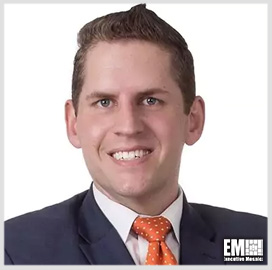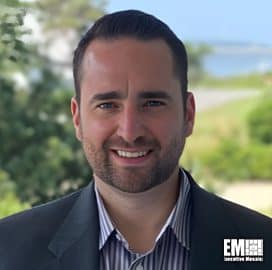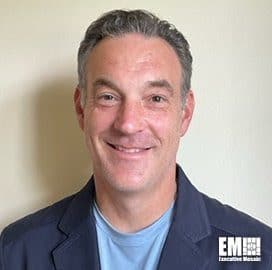
Member Profile: Michael Clauser of Ark
Michael Clauser is the founder and managing director of Ark, where he helps clients navigate the intersection of emerging technology, policy and national security. A former government official who transitioned into industry, Clauser recently joined the Potomac Officers Club. In this conversation, he shares career insights, leadership lessons and his vision for driving innovation across the public sector.
Potomac Officers Club: What can you tell us about your background and how you’ve been able to adapt to the ever-changing challenges of the federal landscape over the course of your career?
Michael Clauser: I think the federal landscape has remained remarkably steady. Federal agencies still send budget requests to the Office of Management and Budget. OMB sends a budget to Congress—occasionally, a touch tardy. Congress still holds posture hearings to review the budget and grill agency heads. An appropriations bill or continuing resolution pops out at the end of the year, or beginning of the next, providing just-in-time funding. I’ve had the privilege to work in the executive branch, legislative branch and industry, with the opportunity to see all sides of the sausage-making.
POC: When did you decide to pursue a career in the federal landscape, and what were the key tasks that you wanted to complete? Any bigger goals you still want to accomplish?
Clauser: I watched the Twin Towers fall on my dorm room TV when I was a freshman at Penn State. I decided then I wanted to work in Washington on national security. I didn’t make it into my first choice, the CIA, but lucked into two junior political appointments at the Pentagon, followed by a stint working for a great member of the House Armed Services Committee and the House Permanent Select Committee on Intelligence.
Joining the U.S. Navy Reserve as an intelligence officer permitted me to work on counterterrorism at a U.S. Africa Command J-2 counterterrorism cell and deploy on the USS Harry S. Truman with Carrier Air Wing Seven in support of Operation Inherent Resolve.
My goals remain: working every day to connect innovative companies to Congress to ensure that the U.S. government has the tools and resources it needs to prevent another 9/11 and to leverage American innovation to improve government efficiency and drive down taxpayer costs.
POC: What do you believe are your core strengths as a leader, and what lessons taught you the most about driving success?
Clauser: My strengths include staying mission-focused with a fixed north star. I use my past experiences in prior roles—on different sides of the policy and budgeting table—to better understand and empathize with those still in government. I let my yes be yes and my no be no, so colleagues always know where they stand. And I pay forward the mentoring I received in my 20s to the next generation.
POC: Who are the executives that have inspired you the most over the course of your career?
Clauser: My father was an executive in the jewelry industry and my first role model for servant leadership and compromise. My first boss in Washington was the Honorable Dr. Chris Lehman, who played an outsized role in shaping how I think about the federal government and the importance of mentoring young people—along with our colleague Capt. Mike Griffes.
Congressman Mac Thornberry had an eye for choosing the most consequential and underappreciated issues to engage with, and I benefited from watching him say “no” (a lot) to those that were not.
Greg Francis at Access Partnership taught me the value of sales and professional services, which are indispensable to me today. And my boss, Jim Green at Okta, taught me how to navigate the lowercase “p” politics of interpersonal relationships.
POC: If your career came to an end tomorrow, what would you say have been the most significant accomplishments of your career? Where do you feel you made the most impact?
Clauser: Having the pen at the staff level on the first draft of the Smith-Mundt Modernization Act remains a professional highlight. The bill brought nuanced reforms to U.S. strategic communication, public diplomacy and information operations in light of a global media environment, enduring non-kinetic political warfare by America’s adversaries and competition for the trust of our allies.
I also remember proudly the first time I successfully inserted additional funding into an appropriations bill for a client.
POC: What are the core values that you believe are essential to build a great team and establish a foundation to drive success in such a competitive industry?
Clauser: Donald Rumsfeld had it right when he wrote, “A’s hire A’s and B’s hire C’s.” A key distinguishing feature between a “B” and an “A” is humility—something with which I have a mixed record at best. So, when hiring, I try to ask myself: Is this person better than me—an A player? How can I hold myself accountable to be worthy of their best efforts?
Because Steve Jobs also had it right: High-performing teams are self-policing. And A players won’t stick around working for or with B-string performers. The best of the best have choices about where and with whom they work. If you’re going to labor 40+ hours a week shoulder to shoulder with someone, it should be high-quality, mission-focused and fun.
POC: If you were given free rein to enact changes in the federal landscape, what are the first three changes you would implement and why?
Clauser: I’d spend most of my time reorganizing congressional committee jurisdictions. That would have the greatest potential for flow-down changes to agency reform. Reforms would include:
- Consolidating all U.S. Department of Homeland Security components, such as the U.S. Coast Guard, Cybersecurity and Infrastructure Security Agency and U.S. Secret Service, under the House Committee on Homeland Security
- Bundling cybersecurity jurisdiction with federal information technology oversight jurisdiction under one committee (can you believe they’re fragmented between different committees today?)
- Doing away with the division between appropriators and authorizers so that a committee that oversees an agency’s authorities also controls the funding—and must make hard trade-offs between competing priorities under a strict budget topline
POC: With emerging technology influencing the federal government and industry more by the day, what are some of the challenges on the business side of innovation that aren’t always discussed as often as they should be?
Clauser: The Potomac Officers Club understands that the U.S. government can be a technology customer. It also understands the government can be a technology regulator—often through the National Institute of Standards and Technology standards baked into the Federal Acquisition Regulations, like the Cybersecurity Maturity Model Certification and Federal Risk and Authorization Management Program.
What we’re sometimes too sheepish to do is call out the government for also being a major technology competitor. A key challenge is trying to do business with a customer who is also your competitor.
In technology, that usually comes in the form of incumbent, custom-built, government-off-the-shelf solutions. These come with a built-in constituency of federal employees, services contractors or federally funded research and development centers, or FFRDCs, invested in not upgrading or adopting commercially available enterprise IT products.
This creates massive barriers to innovation that aren’t discussed enough for fear of alienating the customer. Can you believe that in 2025, some agencies still use their own homebrew HR tech? Or government-coded digital identity login tools? Or cybersecurity platforms? Enough.

Category: Executive Profiles




